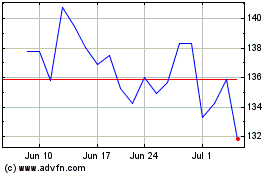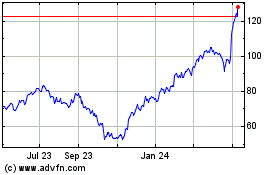UPDATE: Community Health: Tenet's Allegations Skewed, Wrong
April 28 2011 - 1:44PM
Dow Jones News
Community Health Systems Inc. (CYH) reiterated its view Thursday
that rival hospital operator Tenet Healthcare Corp.'s (THC) recent
lawsuit against the company "has no merit" and said it will have no
material effect on operations.
Tenet's lawsuit, which alleges Community Health has overbilled
Medicare by improperly admitting patients who should be observed as
outpatients, arose from Community's ongoing $3.3 billion hostile
bid to acquire Tenet. Tenet based its case on data from two outside
consultants.
"We believe that Tenet's lawsuit against (Community) in this
proxy contest has negatively affected the entire health care
sector," Community said in a roughly 110-page slide presentation
accompanying an investor call Thursday. Community Health Chairman,
President and CEO Wayne Smith started the call, and a lineup of
other company executives were making presentations.
The Justice Department recently filed a court motion indicating
the government has consolidated multiple federal investigations of
billing practices at Community Health hospitals into a coordinated,
nationwide probe, and will work with any states probing the
company.
The Justice Department said in the filing that allegations in
Tenet's lawsuit related to the government probe and to claims in a
separate whistleblower case against a Community Health hospital.
Separately, labor-affiliated shareholder CtW Investment Group has
written to Community detailing its concerns about "aggressive"
Medicare billing practices and last year forwarded its concerns to
government investigators.
Community said it will cooperate with regulators and assist in
any investigation. Nonetheless, it continued to dispute Tenet's
allegations. Community said it expects a decision on its motion to
dismiss Tenet's lawsuit before the Tenet shareholder meeting in
November.
"Over the past two weeks, many independent financial analysts
and industry consultants have reviewed and tested Tenet's
hypothesis and found it implausible and unsupported. We have
reconstructed and tested many of these analyses and done our own
work which, while preliminary, leads us to believe that Tenet is
misguided and wrong," Community said.
Tenet's allegations of inappropriate admissions "are based on
contrived and biased metrics leading to a conclusion of implausibly
inflated financial exposure," Community said. If Tenet believes a
hospital's "observation rate," indicating patients classified as
outpatients, is material statistics, "then why did Tenet not
disclose this metric in its own SEC filings?" Community asked.
"Tenet's biased use of its selected statistical analysis and
failure to review and apply relevant statistics lead to a series of
materially false conclusions," Community said, adding that Tenet
omitted an industry peer, Universal Health Services Inc. (UHS),
with an observation rate close to Community's.
Tenet said in the lawsuit that consultants it hired found
Community Health's observation rate to be "significantly lower than
the industry and its peer companies," or less than half of the
national average. Community expanded admissions by dramatically
reducing observation status at hospitals it acquired, especially in
the case of Triad Hospitals, acquired in 2007, according to the
lawsuit.
Community, in its slide presentation, said that "Tenet's
assertions and analyses regarding the Triad Hospitals transition
... are skewed and incorrect."
Tenet's allegation of 20,000 or more inappropriate admissions in
2009 is "illogical and not supported by the facts," Community
said.
"Tenet's contrived 'observation rate' is not an industry term
and we believe it is not a useful metric," while inpatient rates do
matter, Community said. The company said its 2009 Medicare
emergency-room admission rate of 26.8% is in line with its peer
group, which spans 17.7% to 39.4%, and is near the average of
28.5%.
Tenet also failed to balance Medicare positions regarding use of
observation status and inpatient admissions, Community said, noting
that if a doctor determines care of the patient is likely to take
more than 24 hours, the patient should be admitted.
Community took issue with Tenet's criticism of its use of
home-grown clinical-review criteria, known as the Blue Book,
instead of standards supplied by industry vendors.
"We believe that Tenet implies a requirement that hospitals use
vendor-supplied clinical review criteria and that there is
something nefarious about the clinical review criteria developed
over time by (Community) physicians and other health care
professionals," the company said.
Medicare "does not dictate or endorse any particular criteria.
(Medicare) does not endorse any particular brand of screening
guidelines," Community said. The company said its Blue Book
guidelines for inpatient care aim to have one set of criteria for
all insurers, be easy for the case manager to use, use current
clinical practice and be affordable and cost-effective.
Deutsche Bank analyst Darren Lehrich said Community's data
provides further evidence that the observation rate metric is
"statistically irrelevant" on its own, and seems to dispel Tenet's
allegations regarding the materiality of growth in one-day
inpatient stays in Triad hospitals since the acquisition.
Gimme Credit senior high-yield bond analyst Vicki Bryan said the
presentation "very effectively refuted Tenet's allegations and
supported our initial view that the company is simply an efficient
and profitable operator, which Tenet has not been for years."
A Tenet spokesman said the company would comment after
Community's conference call addressing the matter.
-By Dinah Wisenberg Brin, Dow Jones Newswires, 215-982-5582;
dinah.brin@dowjones.com
Tenet Healthcare (NYSE:THC)
Historical Stock Chart
From May 2024 to Jun 2024

Tenet Healthcare (NYSE:THC)
Historical Stock Chart
From Jun 2023 to Jun 2024
